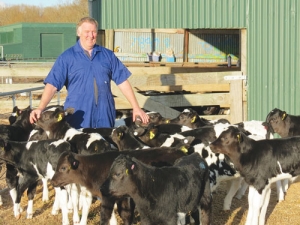The low payout doesn’t necessarily mean dairy farmers will stop work on environmental projects on their farms.
That’s the view of Reporoa dairy farmer Colin Guyton who believes that many things can be done at no cost whatsoever.
Guyton, chair of Federated Farmers dairy section for Rotorua/Taupo, has, apart from a spell as a policeman, spent his life on his parents’ dairy farm and now owns his own dairy farm, 2km from Fonterra’s Reporoa factory beside the Waikato River.
In this sensitive catchment, in the spotlight, Guyton and his wife Shelley are committed to running a sustainably profitable farm. He disputes the idea that the present economic struggles of the dairy industry will cause farmers to pull the plug on spending on environmental work.
“While there may be the odd farmer who says that, in reality there are things we can do that don’t cost money: lowering our stocking rate, better utilisation of pasture to avoid feeding PKE, etc. There is truth in the saying ‘it’s easier to be green when we are in the black’, but that’s not to say that farmers haven’t done a lot over time and will continue to do so.”
Farmers in upper Waikato catchment are waiting to learn from Environment Waikato what new rules they will face on N leaching. Guyton and others in the EW region are watching what is happening in Rotorua where Environment Bay of Plenty is imposing new rules making some farmers unhappy.
Guyton hopes his stakeholder group will influence the outcome in his area. “We hope the decisions will be sensible, to keep farming profitable and help the river. [That would be] the best outcome. We want both.”
He says he’s been told by DairyNZ that 647 sustainable plans have been completed in the Waikato catchment, probably covering most farms, he says. And farmers have taken “5932 actions” aimed at improving their farm environment, debunking the unfair notion that farmers are doing nothing.
“Most farmers in fact have done a lot and spent a lot of money to try to do something positive. We are trying to get ahead of the rules and do something positive. We are better off to front-foot the regulations than be told what to do.”
Guyton was born on his parents’ dairy farm at Reporoa and did all his schooling there.
After his ten years in the police his parents offered him a sharemilking role on their farm which he took. In 2002 he and Shelley bought their own farm.
They milk 560 Friesian cows on 218ha and last year produced 242,000kgMS. They also have a 65ha (eff) run-off on which they winter their stock and produce grass silage in summer. They milk in a 44-aside herringbone shed. Guyton this year has employed a contract milker so as to devote time to Federated Farmers work.
Guytons joined the Tomorrows Farms Today project to benchmark themselves against other farmers, to see how they perform in profits the environment. They do well, he says.
“The main thing we did was reduce our stocking rate which is relatively low at 2.6/ha and we used less than 80 units of N. We are also keeping fewer replacements which is an environment gain.”
The farm operates as ‘system three’ and last year about 82% of its feed was grass. He uses some PKE but says the low payout may change that.
Also of concern to dairy farmers in his region are the new health and safety regulations, thought to be made by people in Wellington who don’t necessarily understand the local circumstances of farmers. He hopes the bureaucrats in Wellington will listen to what’s being said in the provinces.











